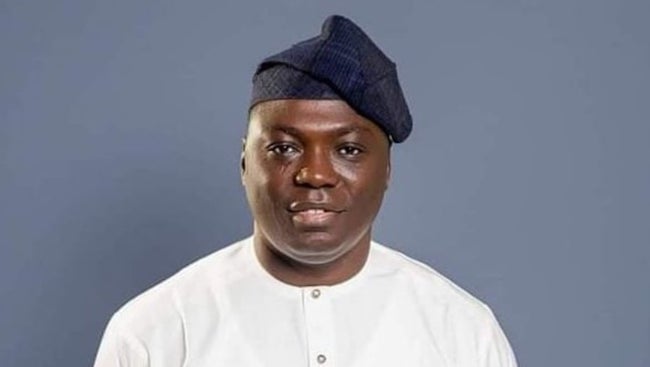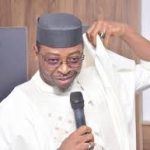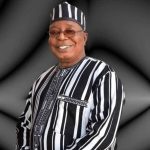The suppressed rumours can no longer be bottled as the whispers have grown louder, not confined to political corridors and recesses of private chats and consultations. Taraba State governor, Dr. Agbu Kefas, is allegedly the next PDP governor to decamp to the All Progressives Congress (APC). Our correspondent privy to the moves indicated that all paper correspondences have been concluded and what is pending is the announcement which could come between now and November barring any changes and the unforeseen.
The November date would formalise the move and Taraba, ince a PDP enclave, will transmute intotheruling APC, not as a result of popular demand but the political consideration of the key actors. If true, Kefas will be joining the swelling ranks of governors abandoning the Peoples Democratic Party (PDP) for the ruling APC, explaining an unsettling reality about Nigeria’s political culture and practice of democracy.
For months, speculation about Kefas’ political future has dominated Taraba’s political space. While the PDP in the state has publicly denied it, insisting Taraba remains a “PDP stronghold,” multiple sources insist that Kefas has already crossed the Rubicon in private.
“The paperwork is completed; what remains is just the public announcement in November,” one political insider familiar with developments said. “The calculation is clear: staying outside the APC while Tinubu holds power is politically suicidal because of the grab, snatch and run with it” political philosophy of APC espoused by the President earlier on.
Another source described the move as “not about ideology, but survival.”
Governor Kefas, a retired military officer, came into office in 2023 under the PDP. But his relationship with the party at the centre has been complex. The APC’s dominance in Abuja, coupled with the realities of federal might in state politics of recent, based on the various judicial compromises and arrangement is said to have tilted his calculations.
For many observers, the Taraba case is emblematic of a wider trend, where governors align with the party at the centre to safeguard their political survival.
“In Nigeria, federal power is everything,” said Dr. Usman Dankwat a political scientist at Taraba State University. “From security to funding, from court cases to contracts, the federal government wields enormous influence. Governors are not blind to this. When your survival depends on Abuja, defection is no longer a betrayal, it becomes an instinct.”
This was echoed by Kaduna-based analyst, Musa Bala, who argued that APC has perfected the art of absorbing defectors. “Tinubu knows the game. He brings them in, reduces the opposition, and strengthens his re-election chances. For the governors, it is a win-win: access to federal projects, protection in court, and better prospects for 2027.
There are also whispers that during the court battles that followed the 2023 elections, President Tinubu personally intervened in many cases involving governors. His goal, according to insiders, was simple: ensure the governors’ survival, but extract loyalty through blackmail in return.
A political commentator in Abuja explained it this way: “The deal was: survive your tribunal, but stand with Tinubu. Now we are seeing the outcome. One by one, they are defecting. It’s no longer a secret.”
Indeed, analysts believe that aligning with the APC is a way for governors to safeguard themselves from judicial surprises. “In Nigeria’s judiciary-politics nexus, the party in power often has the upper hand,” argued constitutional lawyer Barr. Luka Samson. “Governors know this, and they act accordingly.”
Another layer to the defections is the delicate politics of the North. The president has faced heavy criticism from Northern elders, clerics, and socio-political groups over economic hardship, insecurity, and perceptions of marginalisation.
“The North is Tinubu’s biggest headache,” said political journalist Emmanuel Ibuka “Elders have lashed him, the economy has battered ordinary people, and insecurity persists. The president is now doing everything to secure at least 50 percent of Northern votes in 2027. That includes wooing governors, meeting religious leaders, and courting influential blocs.”
Tinubu’s recent moves, including a planned visit to Plateau to engage religious leaders are seen as part of this strategy. “The idea is to persuade the clerics to persuade their congregations,” said a political aide. “This is retail politics at the grassroots level.”
For Tinubu, every governor who defects is more than just a trophy; it is a potential bridge to millions of Northern votes.
So far, Plateau and Kano governors remain among the NNPP and PDP’s most visible strongholds in the North. But observers doubt how long this will last.
“Plateau’s Caleb Mutfwang and Kano’s Abba Yusuf are under pressure,” said Abuja-based columnist Abdulrahman Yusuf. “They may not defect outright, but they will either cooperate quietly with Tinubu or face isolation. The APC knows how to use the carrot and stick.”
Others argue that even if these governors resist, the federal government will find ways to weaken them. “Remember, in Nigerian politics, you don’t have to decamp to be neutralised,” said Bala, the analyst. “Federal power can frustrate you in other ways.”
For Kefas, observers suggest that fear is the biggest motivator.
“Taraba has always been a swing state,” noted Jibrin Ibrahim, a senior fellow at CDD in Abuja. “Kefas knows that remaining in PDP may cost him. With federal might against him, he risks losing not just his seat, but also the future of his political bloc. So, he is calculating that it is safer to join now.”
A PDP elder in Jalingo, however, condemned the alleged defection plans. “If true, it is betrayal of trust. The people voted for PDP, not APC. Jumping ship so quickly is opportunism, not leadership,” he fumed.
While defections may look logical for governors, many worry about the consequences for Nigeria’s democracy.
“The problem is that ideology is dead,” lamented Professor Olufemi Adebayo, a political scientist. “If politicians can jump from PDP to APC overnight, what differentiates the parties? We are turning democracy into a marketplace of survival, not a contest of ideas.”
Civil society groups also warn that defections weaken the opposition, creating a dangerous one-party dominance. “Democracy thrives on competition,” said Yiaga Africa’s Samson Itodo. “If all governors are in one party, accountability dies. Who will check the ruling party?”
Interestingly, joining APC does not guarantee defectors a smooth ride. In Taraba, APC officials have already declared that there will be “no automatic ticket” for Kefas in 2027.
“Let him come, but he will still face primaries,” an APC chieftain in Jalingo was quoted as saying. “We have loyal members who have suffered for years. They cannot be sidelined because of a latecomer.”
This reality makes defections a gamble: defectors may gain federal favour but lose local credibility.
For ordinary Nigerians, the defections are often met with cynicism. “They are not joining APC because of us,” said Rahila Audu, a trader in Jalingo. “They are joining to protect themselves. Does it bring food to our tables? Does it stop the high cost of living?”
Another voter in Wukari put it bluntly: “Whether PDP or APC, nothing changes for the poor. They are the same people.”
This growing disillusionment, analysts argue, is one of the biggest threats to Nigeria’s democracy: a citizenry that sees parties as identical, politicians as opportunists, and elections as mere rituals.
With 2027 looming, the APC appears to be tightening its grip. If more governors defect, the PDP risks entering the elections severely weakened.
“APC’s strategy is clear: absorb the governors, neutralise opposition structures, and dominate the North,” said an investigative journalist. “By 2027, they want to make sure PDP is reduced to a regional party at best.”
Yet, others warn that defections may not guarantee electoral victory. “Ultimately, Nigerians will judge Tinubu on performance,” argued Dr. Madaki. “If the economy does not improve, no number of defections will save him.”
However, the drift of PDP governors into APC reflects the realities of Nigeria’s political culture: power, not principle, determines allegiance. Governors calculate survival, presidents secure loyalty, and parties serve as vehicles of convenience.
For Governor Kefas, November may mark a personal turning point. For Nigeria’s democracy, it may be yet another reminder that ideology is a casualty in the battle for political survival.
As one weary observer summed it up: “In Nigeria, you don’t leave your party because it is wrong; you leave because it is weak. That is the tragedy of our democracy.”






